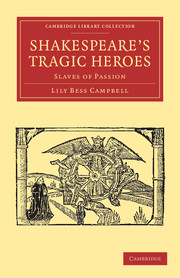CHAPTER EIGHT
Diseases of the Soul. Drunkenness. Fevers. Melancholy. Frenzy. Madness.
Published online by Cambridge University Press: 07 September 2010
Summary
The moral philosophy of the Renaissance was thus built upon a definite and detailed physiological explanation, and no modern psychologist has more strenuously insisted upon the fundamental relationship between body and mind or body and soul than did these writers of the sixteenth and seventeenth centuries in England. That to a great extent this moral philosophy came to centre about the struggle between the sensitive appetite and the reason meant that to the moral philosopher as well as to the physician the abnormal or diseased conditions of mind and body, where the connection of mind and body was most apparent, were of absorbing interest. And the Renaissance philosophers found these conditions in drunkenness, melancholy, fever, madness, frenzy, etc. That they studied these manifestations as states which had in common the predominance of passion over reason is evident to all readers of Burton. The foundation of such thinking is to be found in Aristotle, perhaps most clearly in the Magna Moralia. Aristotle explains that those who have knowledge may still err.
For it is so in the case of persons who are drunk. For those who are drunk, when the intoxication has passed off, are themselves again. Reason was not expelled from them, nor was knowledge, but it was overcome by the intoxication.… So, then, it is with the incontinent. His passion gains the mastery and brings his reasoning to a standstill. But when the passion, like the intoxication, has been got rid of, he is himself again.
- Type
- Chapter
- Information
- Shakespeare's Tragic HeroesSlaves of Passion, pp. 79 - 83Publisher: Cambridge University PressPrint publication year: 2009First published in: 1930

